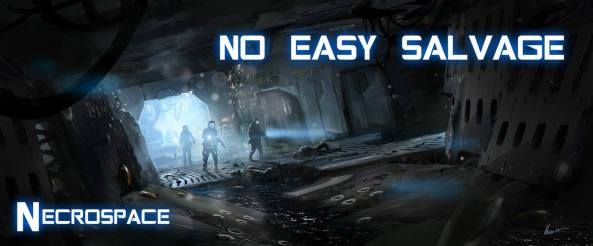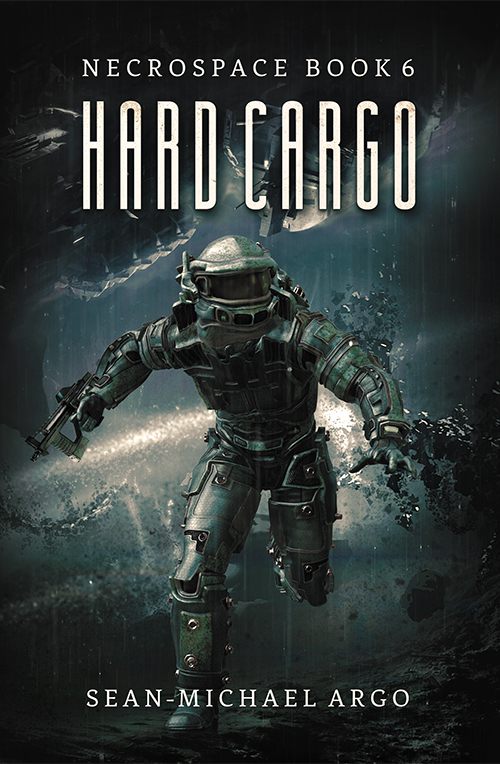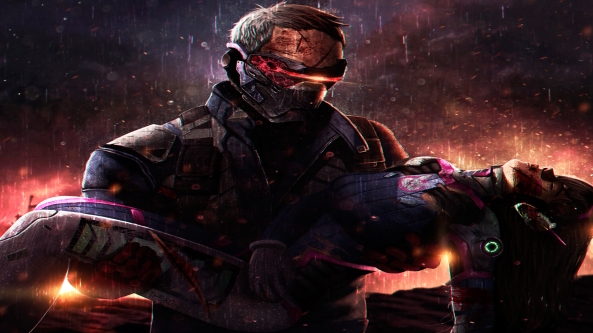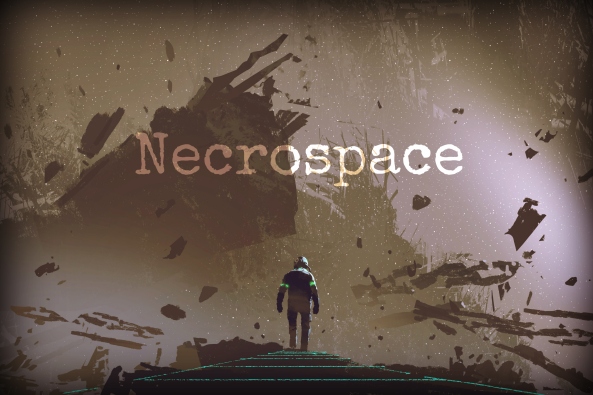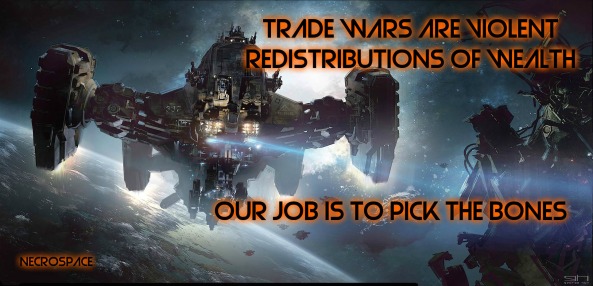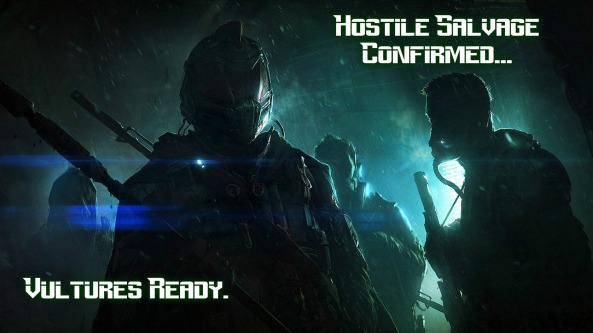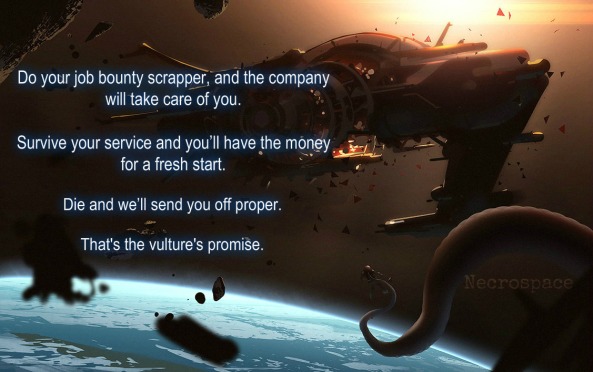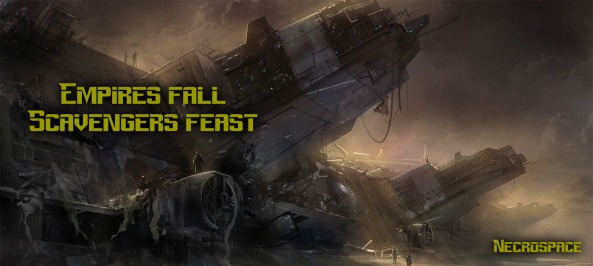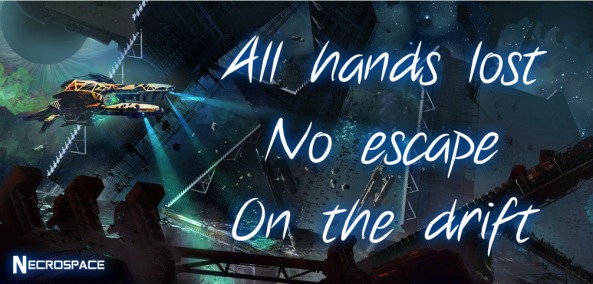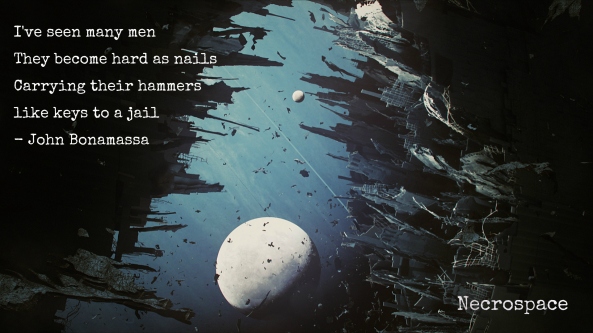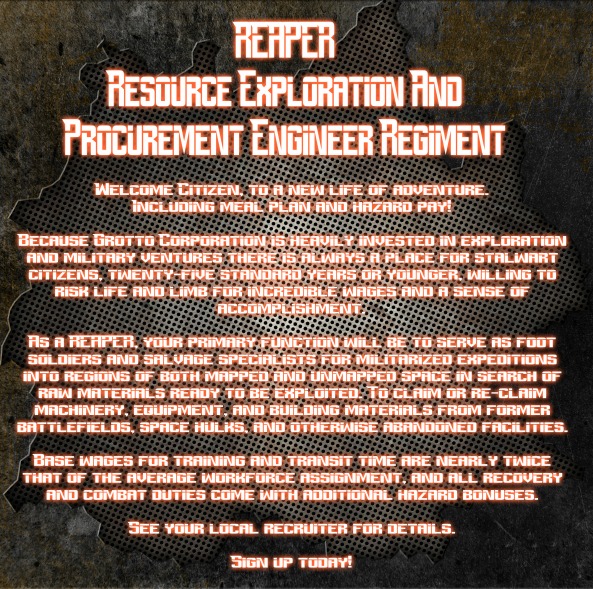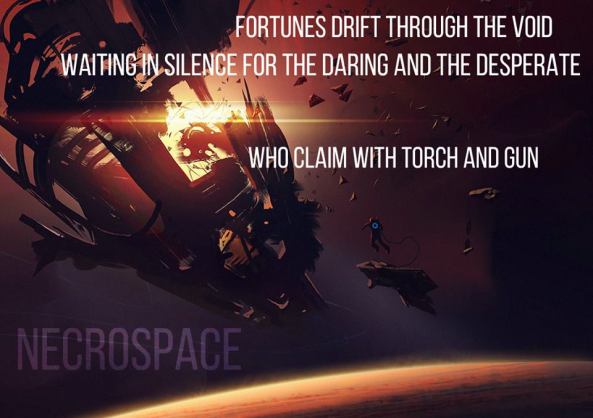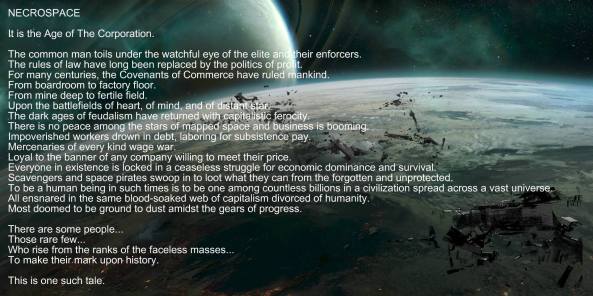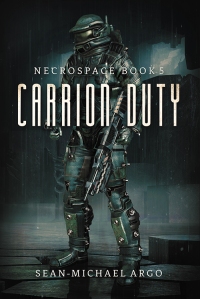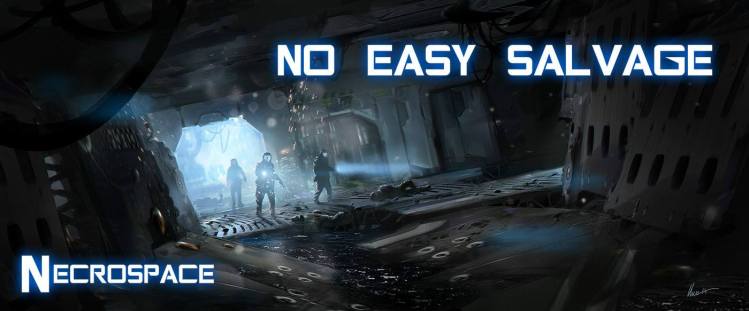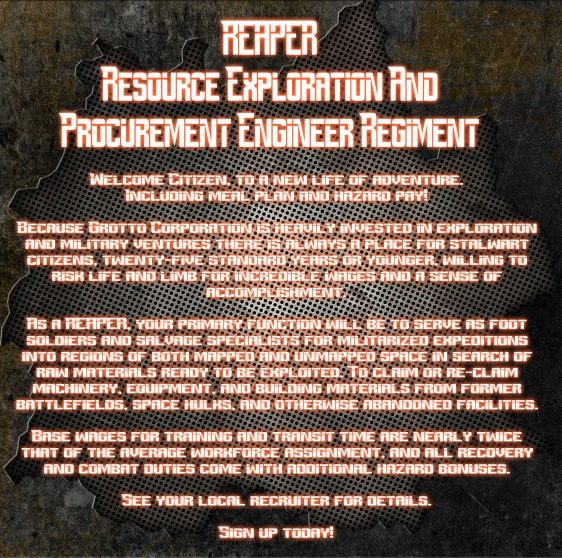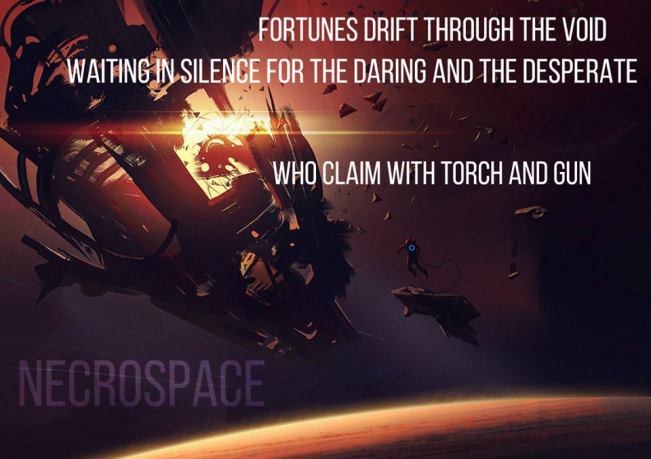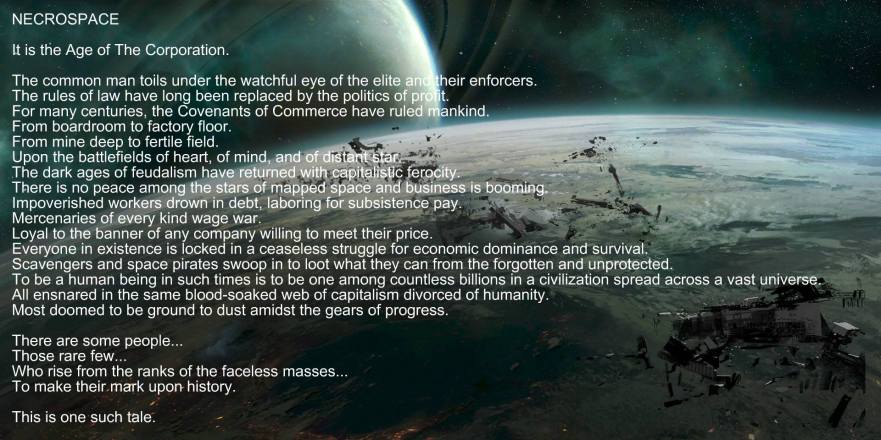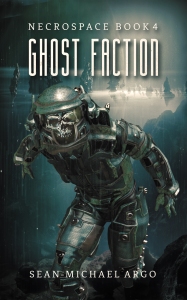Future War Stories presents a Book Review and Author Interview
For much of the history of military science fiction literature, publishers were more selective of the stories they released. Consequently, military SF literature was more rare and limited than standard space opera in the mainstream literature market. That has altered in the 21st century with military matters being more at the forefront of current events. This fueled a boom in military sci-fi works, especially on the flooded Amazon’s ebook market. The new found popularity of the genre of military sci-fi has forced creators to dig deeper and forge something new that can set them apart from the herd of military sci-fi works. One of the best ways, besides awesome cover art, is world building. This is where we creators can and do set ourselves apart, and that brings us to Sean Michael Argo’s military science fiction novelSalvage Marines (Necrospace volume one) from Severed Press. There are two very unique elements in his overall excellent military SF novel that set his story apart and it grabbed my attention. I was grateful that Mr. Argo reached out to FWS to review his novel, providing FWS with a copy from his publisher the purpose of this review.
The Setting
Samuel Hyst was born into a very different era than us, and his experiences in the age of the galaxy spanning corporations that rule and control over their “subjects” could only be understood by workers during Reconstruction and the Gilded Age. At the age of eighteen, Samuel graduated from the educational academy in debt on the order of 18 years’ worth. The Grotto Corporation designed their worlds to be an debt-based society, where debt can and does pass on to the next generation. The goal is for the company to own you by never allowing you to exit out of the debt runaround…and you are owned. The slim dark hope for Samuel and his friend Ben was to join a section of the Grotto military: The REAPERS. This is a feature of the age of corporations: open warfare between the companies over resources, given the term “hostile takeover” a whole new meaning. It is here that Samuel and Ben embark on a new life and new dangers as his old life sits at home, waiting for him to come home.
The Spoiler-Free Review of Salvage Marines
Within a few pages, it was immediately apparent to me that Mr. Argo had set up the world of Salvage Marineswith a solid time-honored sci-fi tradition: taking a current social issue and exploring it via the futuristic setting. Mr. Argo used his far-future setting of Salvage Marines to discuss the current issues of debt, military service stress on families, and corporate role in people’s lives and their militarization. As he lays it out in the first page: “it is the age of corporate” and every single character in the book is affected by that fact. From birth to the sweet release of death, you are in debt before your life starts, and this fact controls how you live your life and dominate society. You are evaluated, processed, and assigned with little care to your wants or needs.This twisted sci-fi reality bears elements of a Dickens’ story or share-cropping. I found this spoke to me deeply and it was a refreshing take on how our main character enters into military service over more conventional means. Mr. Argo moves quickly in these open pages to establish the world, our character Samuel, and his link back to his life back on his corporate colony homeworld of Baen 6. When he enlists into the armed force of corporate soldiers that collect resources for Grotto, the REAPERs, it puts a strain on his family, but liberates them from the life-long debt. At first, the connection between Samuel and his family back home is strained, but it is there. However, it drops off as the pages increase. I am not sure if this was a systemic choice or a simple oversight, but either way, it hearkens to the isolation of military service and has the hard lump of reality.
As events transpire, it only services to further separate Samuel from his family, both physically and emotionally, but it increases his bond with his fellow corporate warriors. This again, was a nice touch of reality and honesty that makes the overall concept of Salvage Marines solid and a firm foundation for the other books in the series. Plus, the author keeps the story moving and that could be considered by some to be a fault. I like that the author did not give us a lengthy boot camp scene that some many books and films have done to death. The action shifts from deployment-to-deployment while Samuel and company are in the Grotto Hive Fleet 822, which is realistic to modern account I’ve read of being deployed during wartime. However, this structure does eliminate some character development via behind-the-wire scenes that often pepper this genre. While there is one major after-action scene, I wished for more. The book, because it is part of a series, does suffer from a lack of completion at the end of the book, but if you are hooked, then you are buying the next one. When it comes to one of the iconic factors of any military science fiction book; the combat scenes, Salvage Marines delivers. These are not over-styled 1980’s action hero battles, but brutal, honest engagements with all of the madness and chaos of the battlefield tossed in. In these scenes, characters die, are horribly wounded, and luck is a roll of the celestial D20 dice. At every engagement that Grotto Hive Fleet 822 was involved in, I wondered if one of the characters I cared about was about to die. While it is serious, there are moments of humor, especially when the author references Warhammer 40,000. Overall, Salvage Marines is a solid military science fiction tale that brings some bold concepts to the table encapsulated within a fast-moving setting of future corporate military services and the terrible price of combat.
Interview with Author Sean-Michael Argo (Conducted on 8/15/2016)
1. What was the genesis behind your novel Salvage Marines?
I have had this story, in one form or another, in my head for a long time, though only in recent years has it transformed from a vague collection of interests, notes, and scraps into a novel series. I find it impossible to enjoy video games, war games, comics, novels, and film without also imagining what kind of story I would tell. You could call that part of my process, to inhale deeply of other works, even if just to get inspired to create my own. The series started to take on a solid shape when I transitioned from a modest filmmaking career to the defense industry, working with a company to provide counter-insurgency training to soldiers soon to go overseas into combat. I found that working alongside soldiers in the conditions and hours we did continued to bring out ideas, whether through conversations with soldiers, or particular actions or events during the training scenarios. I started taking notes, and for several years continued to do so, though it was only recently that I realized I had been slowly building the setting and characters of Necrospace, the fictional universe in which the stories take place.
2. What made you decide to write in the sub-genre of military science fiction?
I’ve been a fan of military science fiction since a young age, and eventually I decided that I’ve had so much enrichment and entertainment from the genre that it was time I added my own work to the genre. I’ve always had ‘writer’ as one of those ‘what do you want to be when you grow up’ answers, and I have been tinkering with a corporate merc story for a long time. I want to say it was when I was fourteen I wrote a single issue comic book script about mercs fighting over a giant planetary terraforming machine, and over the course of the story it achieved sentience and began to defend itself with the re-animated bodies of slain enemies. On top of just having a fan boy vibe from childhood onwards, Military SF in specific is a rather versatile literary playground as far as speculating about what the future might look like, as a writer I get to explore the world even as I create it, and so one could say I’m writing as both an author and a fan. Another, perhaps more commercial reason, is that Military SF is a genre that has readers who are open to new writers. You don’t have to be a household name to attract readers to Military SF books, because they are an aggressive and savvy sort of consumer who is out there looking for good material. As long as you can deliver, the fans of this genre will reward you with their attention, and so success isn’t so much measured in marketing dollars spent, but the work itself.
3. What are some of your favorite military science fiction works and how did they influence you during the development and writing of Salvage Marines?
Some kids grow up pretending to be Batman, others play at being cowboys or cobs and robbers. My little brother and I were Colonial Space Marines pretty much every time we stepped out of the house to go play, with our pulse rifles in hand (made by taking hacksaws and hot glue guns to our conventional water gun toys). Yes, I was likely a bit too young to be watching James Cameron’s ‘Aliens’, but it happened, and the concept of badass future soldiers seized me early. Looking back on it, I may have been working on my ‘mercenary space marines’ projects even all those years ago, as I would tell stories aloud (my brother tolerated it but honestly he just wanted to play already!) about how we were highly paid mercs in power armor fighting for mega-corporations in space. As I got older I certainly spent my fair share of time, money, and energy on playing the miniatures games in the Warhammer 40k setting, and in time discovered (a bit late honestly) the novel Starship Troopers. For me it all goes back to the grunts, especially fromAliens, who I see reflected in the real-life faces of the soldiers I work with.
4. Your fictional universe is tinted through a Gilded Age/Charles Dickens lens that also spoke to the current situation of most of us drowning in college debt. Was this a take on modern society or does it hearken back to the past such as Medieval Europe and Japan?
That is rather perceptive of you about Dickens, I am happy that tone reads clearly in the work. Just as he wrote from a deeply cynical perspective within the post-industrial revolution world, I am certainly coming from a place of cynicism about our globalist corporate dystopia, though like in Dickens’ work there is dignity somewhere inside that bleak world of mine, and hope too. Medieval Europe and Japan are keen examples also, as I am certainly presenting a world that is ‘corporate feudalism in space’ in a no-holds barred sort of way. I am about to reach my 38th birthday, so at least in the USA my own chronological lifespan has been spent living in a decline, with stagnant wages, lost industry, currency inflation, crushing debt, and on and on. All of that finds its way into my work, because so much of it is something real that I can weave into a science fiction tale to make it more authentic. My story is, in a way, what I see in the world, stripped of all the propaganda and nationalism, the grim bits and the hopeful bits all presented with some Military SF flair. I do my best not to get preachy, both because that sort of thing annoys me as a reader, and also because I am attempting to present a story objectively, a great many shades of grey, and so I do my best not to pass on my value judgement as an author, and leave that for the characters. I believe that capitalism can be a force for freedom just as much as it can be a force for oppression, but Samuel Hyst knows better than I do what it’s like to live under Grotto’s rule, so I let him do the talking, and even he has his worldview shaken up a few times.
5.One of the things I enjoyed were the little touches, like the recoil dampeners during micro-gravity combat. Why did you decided to develop the world to that level?
When I am deployed for my military work I usually don’t have the time or energy to write, and so I think, I take notes, and I make plans. My goal is authenticity, which might sound silly when talking about space marine pulp noir, and I think the little details can aide in that. As I roll ideas over and over, examining them from several angles, those little details find their way into the story. I also try to think about what future soldiers would have as far as equipment, because I don’t want it to be so futuristic that the story doesn’t have that visceral quality to it, but I also don’t want to gloss over things in pursuit of style over substance. I intentionally try to balance the little details with being carefully vague about the exact science behind how things work, because I am not a scientist, and I’d hate to come up with something so ridiculous that it takes my readers out of the story. The same goes for the military jargon, tactics, etc.
6. I have to admit that the chapter entitled “Space Hulk” made me smile along with the marines discussing their childhood gaming history. Very Clever. Did you play Games Workshop Space Hulk or 40K as a kid?
Oh hell yes. I liked the Eldar (basically space elves) because they were the cheapest army to buy, since individual warriors were so powerful and I didn’t have the cash to get into a miniatures arms race with my friends (it happens). I wanted to give a nod to Warhammer 40k, as it certainly has influenced me as an artist, and I loved the Space Hulk game so much that I thought it would be a cool moment for the characters to bond while giving a high five to my influences.
7. As with Game of Thrones, no one seems safe in your universe. What lead you to this style? One of my favorite characters in the book died and I was shocked.
I find that the older I get the more I prefer stories that have a credible threat present in them, and so writing (or reading) novels about invincible heroes overcoming impossible odds time and time again just isn’t something I am interested in. I want readers to feel some degree of the intensity of these battle sequences, the raw desperation, the mistakes that can be made, and yes the occasional moments of sheer badassery. So many soldiers I work with talk about losing friends and comrades in the blink of an eye. They are there one moment and gone the next, and there is often no large dramatic moment, they are just dead and the fight goes on. That creates an ever-present threat, a tension, and I wanted that to permeate my story. I want the readers to feel just as unsure as Samuel, to know that safety is not guaranteed. Salvage Marines is a story about desperate people rising to the challenges that life put in front of them, they aren’t super-soldiers, they are just regular grunts trying to survive their tour of duty and make a decent paycheck. They aren’t the best soldiers in the universe, they have second rate equipment, and they are continuously thrown into the hostile unknown. If we don’t know who will make it and who won’t, then the fighting starts to matter in a more personal way.
8. What made you chose kinetic energy projectile weaponry over directed energy?
I didn’t want the technology to be so advanced that the soldiers could blast each other over tremendous distances. I wanted their armor technology to be sufficient that they’d have to get in closer to do the deed. I am attempting to write with a more “Vietnam era” style of combat tactics, and such tactics require the weapons that make those tactics make sense, and so I went with projectiles instead of laser beams.
9. I have always loved cover-art, and the cover-art of Necrospace Book 1 of Salvage Marines is quite arresting. Tell us more about it and the artist.
I will get back to you on that, this was an unknown artist from the publisher’s side of the desk.
10. Why did you decided to use mega-galactic spanning corporations instead of an oppressive government to set up human space society?
I wanted the setting to feel familiar, despite the fact that it is science fiction. Planet-spanning corporations already cover the world, many ruling corners of it through a thin veneer of politics and nationalism. That’s not hyperbole, just the world as it is, all I am doing is changing the scale of humanity’s footprint on the face of the universe and pulling away the veneer. In my setting the mega-corporations do not hide their mastery, and warriors wear logos instead of flags. It may be a dystopian setting, but I feel that it is an honest one, and have presented a setting in which characters do not think in terms of patriotism or nation states, human beings (mostly) are valued by what they can do more than who they are (race, gender, age). This is very much a Military SF take on the wars for profit waged in the real world, the struggles between the 99% (peasants) and the 1% (elites), and the human cost of capitalism left unchecked by compassion. Most of the first trilogy deals specifically with Grotto Corporation, which is the most grinding and powerful corporation in the universe, though later in the trilogy and certainly in the expanded universe we are presented with other corporations, some similar and others vastly different, yet each ultimately serving the Bottom Line.
11. Names and how am author chose them always interests me. How and why did you decided on the corporation names, the names of the main characters, and even the locations. For example like Baen 6, Folken, M5597, and Grotto?
Grotto Corporation has been with me since I was a kid, that was the corporation that the characters worked for in the stories I’d tell when my brother and I were playing, and when I wrote my little comic book script. Most all of the rest of it starts out as something akin to ‘word salad’, and I just write down scraps and notes until a name or title comes out of the chaos. If it sounds legit, then I keep it, if not, it goes back in the mix. I didn’t want the names to sound overly ‘scifi’ so kept most of it blended with more traditional names from various existing Earth cultures.
12. While the REAPERs are the main focus, the Folken mercenary forces were damned interesting. Tell me about what led to their development and are they featured in another novel?
The Merchants Militant are the sharks of Necrospace, and in my imagination the Folken are the great whites. Of the elite mercs who wage war across the universe the Folken are the biggest and the baddest. A little backstory is that they were founded by a splinter group of Errolite warriors who broke official ties with Augur Corporation and joined the Merchants Militant. While most of the Merchants Militant are more like modern special forces teams, operating in small and somewhat specialized units, the Folken are able to field a fully functional army, in that they have multiple types of soldiers, tanks, ships, artillery, etc, that while rather small is extremely dynamic. We get more into the Merchants Militant in subsequent books, and the Folken certainly re-appear.
13. The combat scenes were richly developed, what is your approach to writing and developing combat scenes in Salvage Marines?
I spent some time training in stunts and combat choreography when I started in the film industry, and part of that education is learning how to communicate blocking and movement to actors and camera people, both as a choreographer and a writer. When I started doing the military work I was able to be in the thick of combat training scenarios over and over, in addition to directing and working with officers and civilians to ensure maximum training value. As such I’ve been able to witness first-hand the chaotic insanity of combat (at least in training scenarios) and watch how soldiers move, how they speak, hold their weapons, and overall how they fight. I want the combat in my stories to have a realistic quality, even if still in keeping with the more cinematic and dramatic elements of Military SF. Generally I do not plan my combat sequences, instead I come up with the mission, pre-establish the available forces, dispositions, and capabilities. Once I am ready I insert my Reapers and let my fingers type out a natural resolution, adding a little dramatic flair along the way.
14. Given the brutality of your setting and novel, did you ever feel bad about the situation that you put Samuel into? Did you ever want him to just go home to his wife and child?
War, especially in its modern form, is without narrative. So many of the soldiers I speak with who are returning from Iraq and Afghanistan talk about a feeling of emptiness with regards to what they accomplished over there. In WWII our troops were on a mission to defeat Hitler, and while that alone isn’t much of a narrative, at least they had that context. Our modern military forces just move from briefing to mission to debriefing to rest & refit and then back to briefing for the next mission. They don’t get to see a wider context, and so often do not see much of a point beyond their individual experience. I approach Samuel’s life in the same way, where he is thrown from calamity to calamity, and the real story is his human journey through those myriad adversities. At the end of the day this is a story about people at war, not so much the war itself, and if he just stayed home and stayed at work we wouldn’t have much of a story to tell, or at least not a Military SF one, which is perhaps where Dickens and I part ways, each tell a different tale of similar folk.
15. What is next for you and your Salvage Marines series?
As of this interview there have been three books published in the Necrospace series, the first being of course Salvage Marines, followed by Dead Worlds, and then Trade War. The audio books are presently being created. These form the core trilogy (the Reaper Cycle if you will) and from there I am writing stand alone novels in an ‘expanded universe’ that continues the overall story, dives into subplots, gives supporting characters their own moment to shine, etc. Presently book four, Ghost Faction, is being prepared for publication, and I am in the process of writing book five right now. I am committed to seven novels at this point, to complete the meta-narrative that I have laid out. After that I will assess where I stand creatively, commercially, and either continue with Necrospace or see what other adventures await, maybe both. I do plan on creating at least one comic book venture in this series, even if just a three issue arc, though that will be more of a late 2017 affair. If any of you Hollywood types want to take this to the screen, I’m right here daydreaming about it! www.necrospace.com
Should You Read Salvage Marines?
Yes! This is a fast paced solid military science fiction book that hits hard with some unique world buildings that is topical today and sets the tone for the rest of theNecrospace series. The action is rough with characters falling in the name of corporate service of Grotto, which makes you wonder…who is next? I can fully recommend Salvage Marines and I expect great things from Mr. Argo in this genre in the near future.
Here’s the link to the original review/interview and the great blog site Future War Stories.
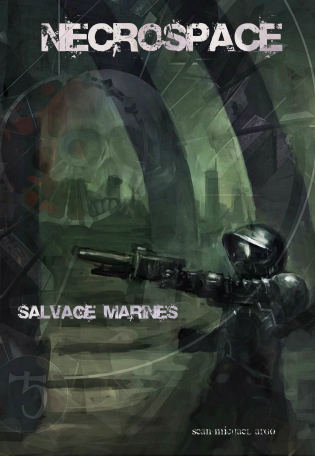 My self-sublished novel
My self-sublished novel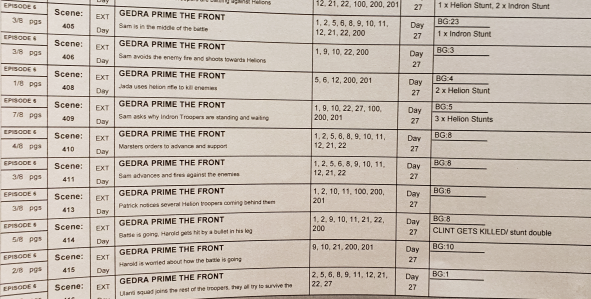 Sample of our shooting schedule.
Sample of our shooting schedule.